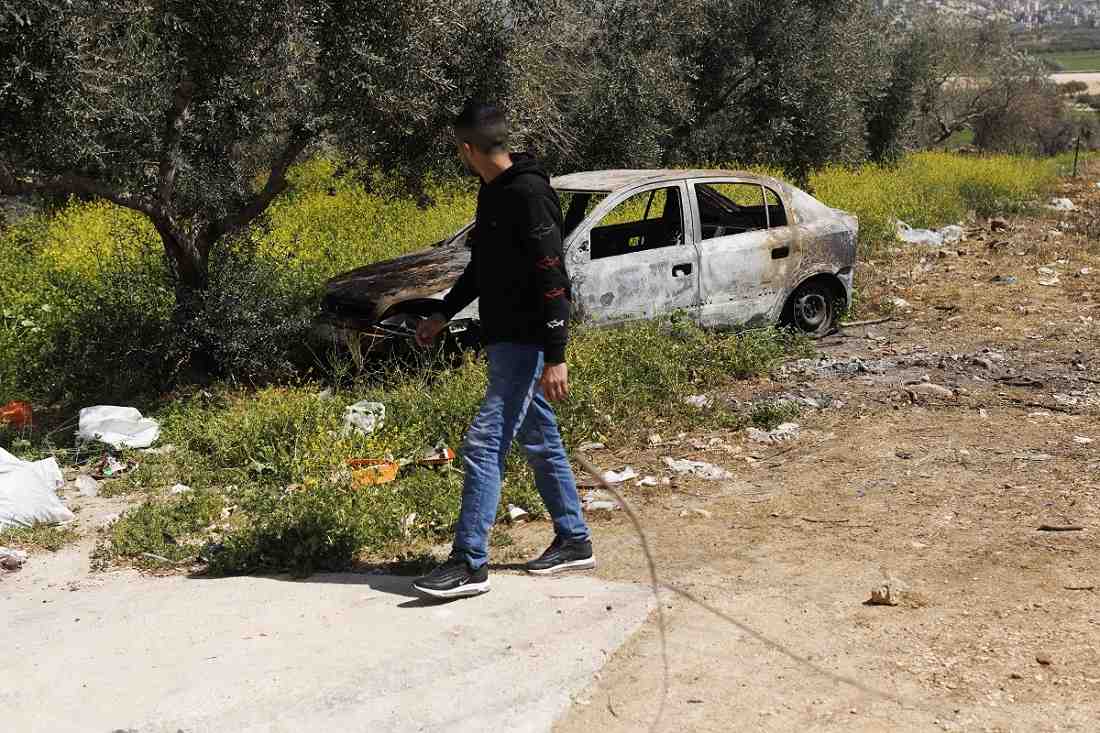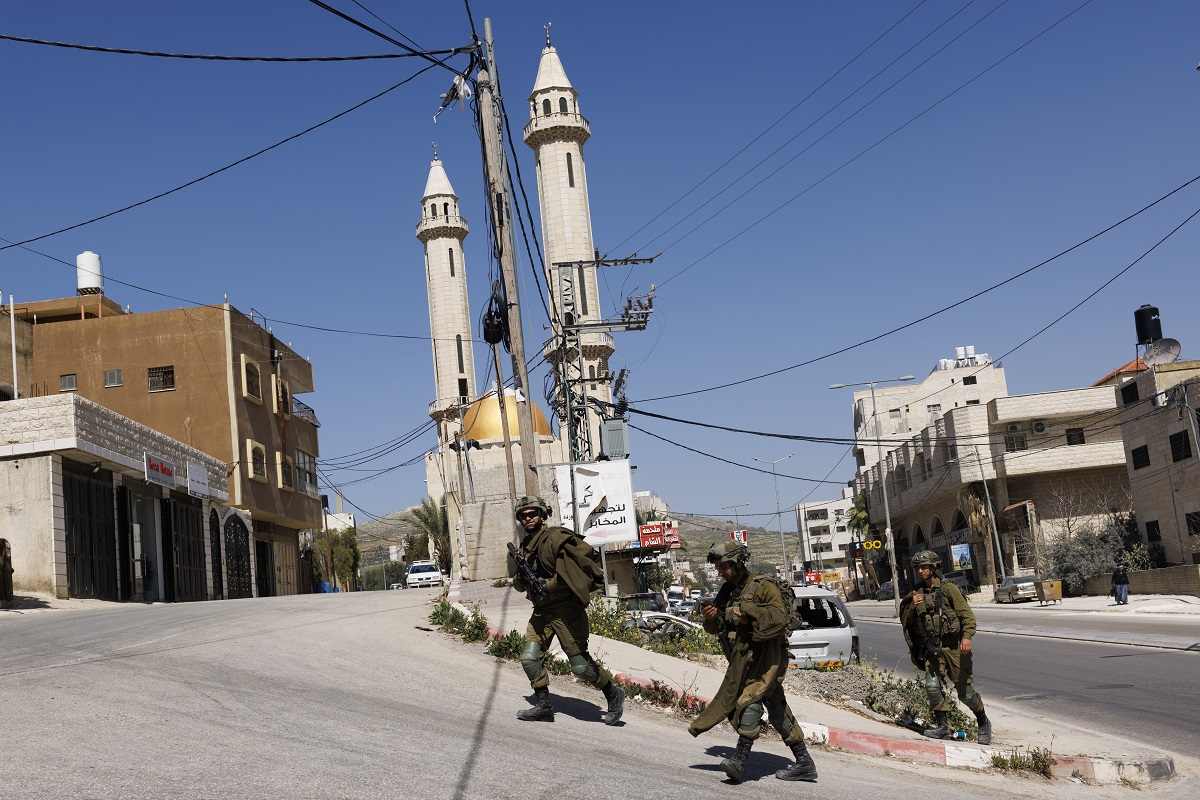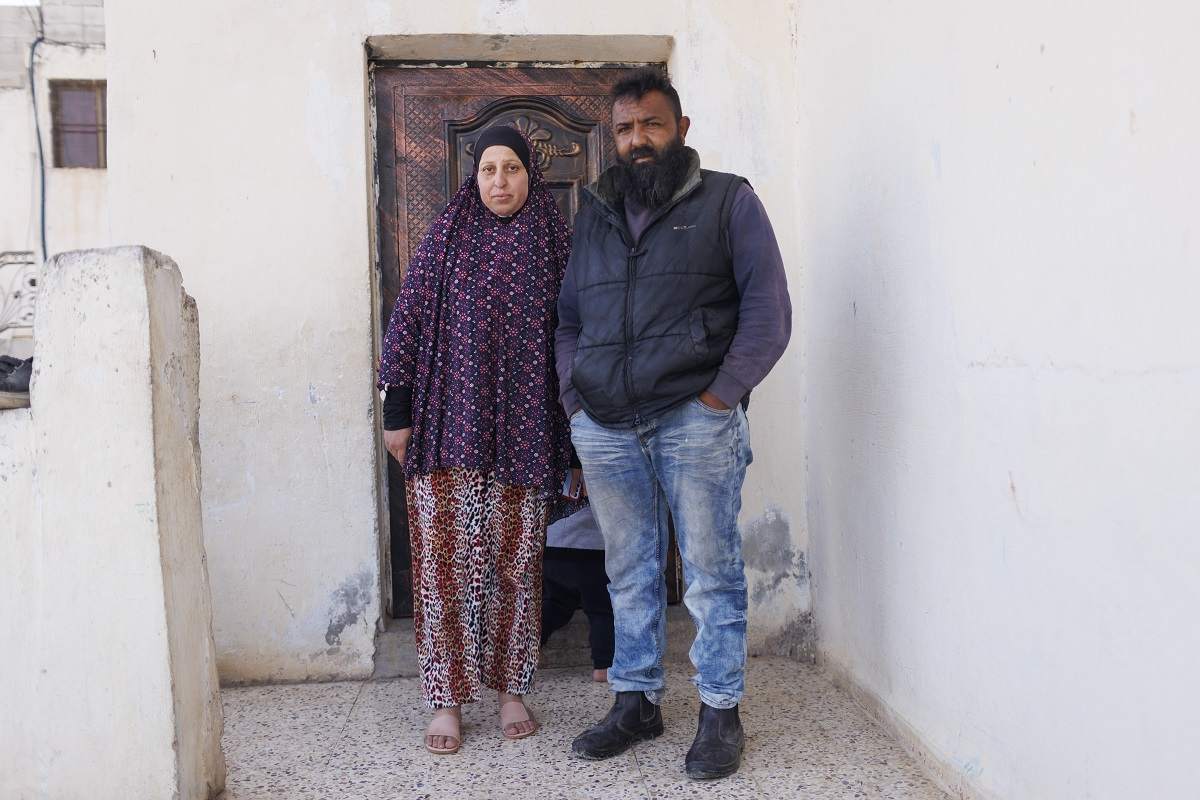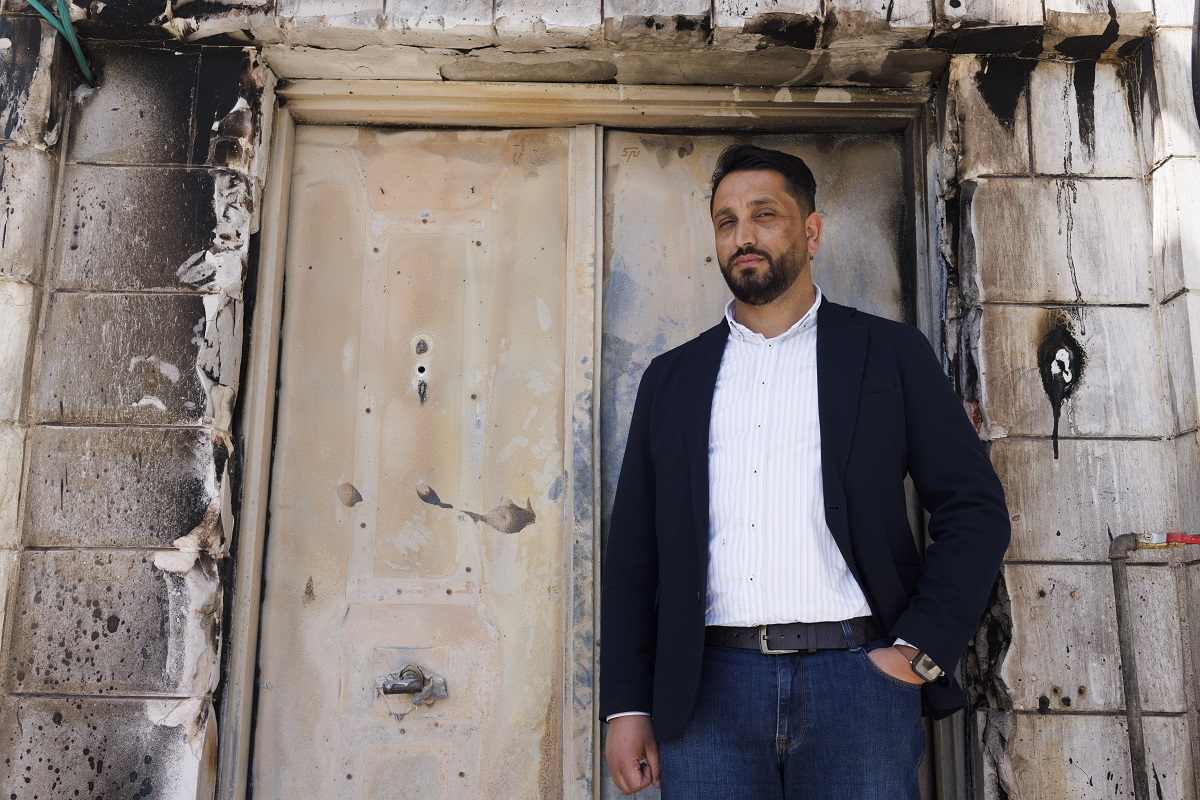
A man walks by a burned car in Huwara in the West Bank on Sunday.
14:29 JST, March 18, 2023
ZATARA, West Bank – More than two weeks after Israeli settlers rampaged through Palestinian villages and towns, killing one man and torching dozens of homes and businesses, residents are wondering when justice will come, and who will deliver it.
They point to delays in the Israeli police investigation into the killing of 37-year-old Sameh Aqtash, who was shot dead as he and his relatives tried to protect their village of Zatara.
And families and rights groups say the Israeli military has still not answered key questions about its role on Feb. 26, and why it failed to contain the violence, which was sparked by the killing of two Israeli brothers in nearby Huwara.
The U.S. State Department has called for Israel to hold the perpetrators to account. But because the attacks took place in areas of the occupied West Bank outside the jurisdiction of Palestinian security, the pursuit of accountability now rests with the same Israeli security apparatus accused of failing to intervene that night.
Facing increasing attacks from vigilante settlers, Palestinian families here say they have no one to protect them. In a conflict with the struggle over land at its heart, some are wrestling with agonizing decisions over whether to leave their homes, to areas farther away from settlements.
“If the judge is your enemy, what’s he going to do for you?” said Ayman, the cousin of the man killed that night. An Israeli military vehicle was present when Sameh was shot, according to videos shown to The Washington Post by eyewitnesses.
Ayman had expected Israeli police to arrive the next morning to take the security camera footage from his village. No one came.
Over the next two weeks, Ayman and his relatives went to a police station and military office to push for a probe, but were turned away each time, they said.
On Monday – 15 days after the fatal incident, and after Ayman had provided the footage to The Post and other outlets – Israeli police arrived in the village to take witness statements and collect the CCTV footage.
Addressing the delay, Mirit Ben Mayor, an Israeli police spokeswoman, said police had launched an investigation on their own “initiative,” as the family had not lodged a complaint. She said she was unaware of them being turned away from the station.
The killing of Aqtash was the most serious incident in a night of brutal violence in the West Bank on Feb. 26 when hundreds of settlers went on a four-hour rampage through Palestinian communities. They were armed with guns, metal rods and stones. They set fire to cars, businesses and family homes.
Hours of security footage from Feb. 26 obtained and reviewed by The Post show Israeli soldiers among groups of settlers as they walk up and down the main street in Huwara, pelting storefronts with stones and setting fires to buildings, some with residents inside. Soldiers are seen chasing away a group of rock throwers at one point, but otherwise make little visible effort to control the violence.
The Israeli military has admitted it had insufficient forces in the area that night, even though the “scale and intensity of the violence were exceptional,” in the words of Lt. Gen. Herzi Halevi, chief of the General Staff of the Israel Defense Forces (IDF). The military has said Israeli police are now investigating the rampage to “the fullest extent of the law.”
Violence is exploding across the West Bank, where Israel has launched a series of deadly raids this year targeting a new generation of Palestinian militants. At least 78 Palestinians, including fighters and civilians, have been killed since the beginning of 2023.
At least 14 Israelis have been killed in attacks by Palestinians over the same period, including seven in a mass shooting outside a Jerusalem synagogue in January; on Feb. 26, a Palestinian militant killed Yagel and Hillel Yaniv, two young brothers from the settlement of Har Bracha, firing 12 times into their car as they sat in a traffic jam, police said.
The shooter would remain at large until March 7, when Israeli forces swept into the West Bank city of Jenin and killed Abd al-Fattah Hussein Ibrahim Gharusha. Local Telegram groups were quick to identify Gharusha as the Huwara attacker, sharing pictures of him wearing a headband with the insignia of the Qassam Brigades, the military wing of Hamas.

Israeli soldiers on patrol in Huwara on Sunday.
On the night of Feb. 26, though, it was the people of Huwara and the surrounding villages who were made to pay for his crime. In nearby Zatara, home to around 70 members of the same family, villagers closed and secured the gates to the town. They called on relatives from nearby Beita to help, lining the fence and throwing rocks at the approaching settlers.
“What could we do?” Ayman said. “Who is going to defend us? Not the army, not the Palestinian Authority. We are not more than 12 men.”
In his office, just around the corner from where his cousin was fatally shot in the stomach, Ayman scrolled through security footage from that night. “See the army jeep here,” he said, pointing at vehicles on the road.
But Ayman has few illusions about who the army was there to protect, or about his family’s chances of justice. “Only God protects us,” he said.
He scrolled forward to the moment the first live ammunition was fired and the crowd ducked and scattered.
A few minutes later in the footage, a group rushes past carrying his injured cousin, who had returned just days earlier from volunteering in the Turkish earthquake zone.
With the main road blocked, the family had to drive him on a dirt track to Huwara for medical treatment. He succumbed to his injuries.
Ayman says he does not know if it was a settler or a soldier who fired the deadly shot, but he believes the military could have cleared the attacking crowd. The Israeli military did not directly answer a question from The Post about whether its forces used live ammunition in the area, saying only that “the circumstances of death of the deceased are being examined.”
Police arrested 14 Israeli suspects in the wake of the Huwara rampage, Ben Mayor said, but all were released by the courts. Two were then placed in administrative detention, which allows Israel to hold them without charge, a mechanism usually used for Palestinians.
Still, the fact that no one has been charged “tells you everything you need to know,” said Hagai el-Ad, executive director of Israeli human rights group B’Tselem. “This is around an event that has captivated international attention perhaps more than any other,” he added. “Impunity is the norm.”
In other areas attacked on Feb. 26, many families pulled down the shutters and hoped for the best, gathering children into rooms away from windows. While large-scale attacks on central Huwara are rare, acts of settler violence are routine – and on the rise – in Palestinian communities that border far-right Israeli settlements.
In Burin village, also attacked that night, the Soufan family home sits alone on the hillside just below the Yitzhar settlement, known for being among the most extreme of the hilltop outposts in the area.
The extended family of 12 hasn’t left the house empty for 20 years, fearing it will be overrun by settlers.
They are used to having their windows broken. Ten family cars been burned over the years. But the attack last month, they said, was the worst since the days of the second intifada, the last Palestinian uprising.

Ayman Soufan, 44, with his wife in the West Bank village of Burin on Sunday.
Ayman Soufan, 44, said the settlers used an electric circular saw to break through the locks on the family’s garage, then set fire to both of their cars.
“We are paralyzed now,” he said, adding that he has little hope of being compensated and still has to make payments on one of the vehicles. The State Department has called on Israel to provide compensation for damages, which amount to around $5 million, according to Huwara’s municipality.
Since 2005, only 3 percent of investigations into “ideological” crimes committed by Israelis against Palestinians have resulted in convictions, according to data released late last year by Yesh Din, an Israeli rights group that tracks settler violence.
The violence has only intensified in recent months, according to Yesh Din’s director Ziv Stahl, coinciding with the swearing in of the most right-wing government in Israel’s history in December. Finance Minister Bezalel Smotrich called for Huwara to be “wiped out” after the settler rampage. He later walked back the comments.
“The people that commit these crimes, they get the message,” Stahl said.
The main street that cuts through Huwara is dotted with Israeli military and border police. If military forces see Israelis attacking Palestinians or their property, they are supposed to detain or arrest suspects until police arrive.
“We see it all the time that no one gets arrested at the scene even though they have the authority and the responsibility,” Stahl said.
In the aftermath of an incident, a Palestinian can file a complaint with Israeli police, but most police stations are located in settlements, which Palestinians cannot access without an escort.
The police responsible for investigating settler attacks fall under the purview of Itamar Ben Gvir, Israel’s far-right national security minister, who got his start as a lawyer defending radical settlers accused of violent crimes.
Last week, a group of half a dozen Israeli military officers and a few policemen showed up at the Abu Al-Ayal Mall supermarket in Huwara. They took security footage from March 7, when the supermarket was attacked by settlers for a second time, but were not interested in footage from the larger attack on Feb. 26, said supermarket owner Firas Demaidi.

Firas Demaidi, 36, the owner of the Abu Al-Ayal Mall supermarket, stands near a burned door near his shop in Huwara.
“It’s a show for the press and the international community,” Demaidi said of the investigation. “Israel knows these settlers.”
Ben Mayor said that police are thoroughly looking into incidents of “vandalism” on Feb. 26 and the investigation is “ongoing.”
The video from Feb. 26 shows settlers setting fire to Demaidi’s store in front of a military vehicle. His mother and sisters were in the apartment upstairs, and were trapped for days after the key for the main door melted into the lock, sealing it shut.
“All this would not happen without the backing of Israeli politicians,” El-Ad said. “This is by design and there is a purpose, and the purpose is to . . . take Palestinian land.”
Some families have decided to leave. Mohammed Hanoud, 42, who lives on the edge of Burin, recounts how settlers accompanied by Israeli forces stormed the village on March 3, less than a week after the violence in Huwara.
“We’ve reached the point where the settlers are coming to break the door down,” said the father of four. In footage filmed by Yesh Din, a group of rock-throwing attackers can be seen descending on the village before shots ring out.
The family says it was live ammunition, pointing at bullet holes in the water containers on a neighbor’s roof. The Israeli military said it arrived on the scene and “after a short time exercised riot dispersal means and the confrontation was dispersed.”
Worried about his children, Hanoud put his house on the market later that day. They hope to move further into the village.
“It’s a new level, it’s more savage, and it’s aiming to kill,” said his wife, Wafaa. “There is no life, no comfort, no sleep. We are always watching at the windows.”
Top Articles in News Services
-

Survey Shows False Election Info Perceived as True
-

Hong Kong Ex-Publisher Jimmy Lai’s Sentence Raises International Outcry as China Defends It
-

Japan’s Nikkei Stock Average Touches 58,000 as Yen, Jgbs Rally on Election Fallout (UPDATE 1)
-

Japan’s Nikkei Stock Average Falls as US-Iran Tensions Unsettle Investors (UPDATE 1)
-

Trump Names Former Federal Reserve Governor Warsh as the Next Fed Chair, Replacing Powell
JN ACCESS RANKING
-

Producer Behind Pop Group XG Arrested for Cocaine Possession
-

Japan PM Takaichi’s Cabinet Resigns en Masse
-

Japan Institute to Use Domestic Commercial Optical Lattice Clock to Set Japan Standard Time
-

Man Infected with Measles Reportedly Dined at Restaurant in Tokyo Station
-

Israeli Ambassador to Japan Speaks about Japan’s Role in the Reconstruction of Gaza
























